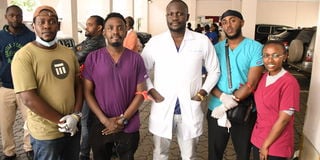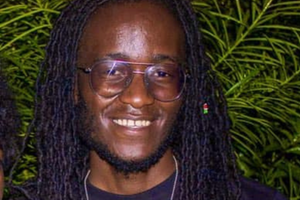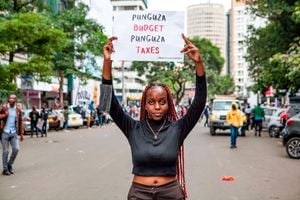Meet the hero medics in the anti-tax demos

What you need to know:
Thousands of Kenyans flooded Nairobi's CBD on June 20, chanting their frustrations during the anti-tax protests.
The Jamia Mosque on Banda Street opened its doors to anyone seeking shelter during the protest. By midday, the parking lot had been transformed into a bustling aid station.
Seething with anger and bursting with energy, thousands of Kenyans flooded Nairobi's CBD on June 20. Protests against the 2024 Finance Bill raged on, with chants of frustration and anger echoing through the streets. Placards emblazoned with bold slogans were hoisted high in defiance of the bill.
As police officers fired rounds of tear gas and water cannon to quell the situation, the crowd scattered in pandemonium. Some tripped and stumbled, coughing and with stinging eyes from the tear gas. Others were knocked down, and wounded by the canisters.

Amid the chaos was a group with an even greater mission. They were medics, helping the wounded and directing them to where they could receive immediate medical attention.
The Jamia Mosque, on Banda Street in the heart of Nairobi's CBD, opened its doors to anyone seeking shelter during the protest. By midday, the parking lot had been transformed into a bustling aid station.
A team of medics, including doctors, clinical officers, nurses, paramedics, medical students and even consultants, tended to a stream of patients. Cuts, dizziness, fractures and tear gas inhalation were among the injuries they tended to.
"After what happened on Tuesday, June 18, we decided to come together and offer medical support," said Dr Austin Omondi.

Through the social media platform X, he got in touch with Dr Salim Ishmael and they both recruited other doctors to come on board. Within hours, various experts were offering their support. Some sent money, others brought medical supplies; dozens turned up. By afternoon, medical volunteers were still pouring in to help, amid a shortage of medical supplies caused by the demand for medical care.
"We started this yesterday and we are doing it out of our own pockets and with the support of well-wishers. We just put our numbers out there and asked those who are going to be injured, whether they are police officers or Kenyans, to come here. We have at least 100 medics here and about 2,000 in different parts of the county.
"We started this yesterday and we are doing it out of our own pockets and with the support of well-wishers. We just put our numbers out there and urged those who are going to be injured, whether they are police officers or Kenyans, to come here. We have at least 100 medics here and about 2,000 in different parts of the country. We also have 17 stations and ambulances in Nairobi and Kisumu," he said.

The services provided by the medics at Jamia Mosque were similar to those found in a health facility triage, basic assessment and first aid. Patients who needed further medical attention were referred to nearby public health facilities and accompanied by a team of medics in an ambulance.
"So far, we have attended to more than 20 patients and provided telemedicine support to dozens of others, and it's barely 1pm," said Dr Omondi, adding that the services were provided free of charge.
Stephen Ogada is one of the picketers who benefited from these services. "I came here to demonstrate like my colleagues. I am here to seek medical attention because I was injured when a tear gas canister was thrown at us, injuring my leg and hand. For a moment I thought I was gone, but my friend called the hotline and brought me here to get help," he said.

Unaware of the chaos, another victim found herself in the middle of the protest.
On an errand in the CBD, she was unaware of the demonstrations when a sudden scramble for safety sent her sprawling. A sharp pain shot through her knee as she hit the ground. Fortunately, the medics at the makeshift aid station were quick to respond. They bandaged her injury and offered her a quiet corner to relax.
Gordon Nyongesa is a registered nurse but unemployed. He turned up to offer his expertise and was one of the people who answered the hotline. As the ambulance he was in wound its way through the city to take an injured Gen Z protester to Mbagathi Hospital, he was busy on the phone.
"Where are you?" asked a distressed caller. Is anyone with you? Don't hang up, I'll stay online until you find someone to take you to Jamia Mosque.
To another he said, "Please take some water and if you can find a place to sit, please do so for some time. I am happy to offer my services today," he told Nation.Africa as the ambulance parked at the archives to pick up another injured person. This time it was a gunshot wound and it was unclear how he had been injured.

Some of the ambulances used to transport medics and casualties had been offered by Nairobi County.
"This is voluntary work. Everyone has just come to be part of the Kenyan spirit. And we are in discussions to ensure that this becomes part of our service to Kenyans in the future. Every time there is a situation like this, we will be out here to offer our skills. I would also like to thank Jamia Mosque for giving us this space today," said Dr Salim.





